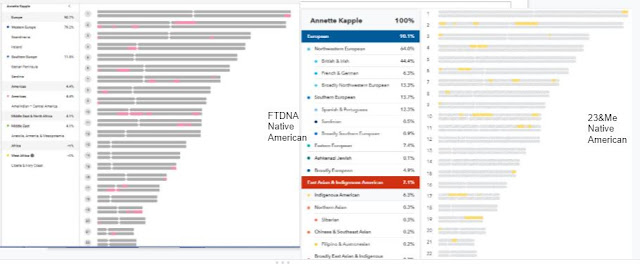I was surprised when I checked a cousin's ThruLines matches to find a child attributed to an ancestor I didn't recognize? I've done a great deal of research on this line and didn't recognize this child at all. This cousin shares 4 matches descended from this Elias Owen or Owens. Our shared ancestor John Owens and wife Susannah's family is well documented with estate records and a lawsuit against the estate by adult children of this couple. There is no Elias in those records. Checking the trees attached to the matches I noticed a couple of matches added our John and Susannah to their trees. The other two people had no parents for Elias on their trees. They shared the same line up to Elias which meant they were thought to share all the same ancestors beyond Elias.
This did make me wonder momentarily if I was researching the right Owens family? Looking at where Elias lived he doesn't appear to be related to our Owens family, and definitely isn't a son of John Owens. So why does my cousin have 4 matches through Elias Owen? Checking shared matches I noticed a couple of these matches also matched my cousin's maternal first cousin. It's likely that these matches are through his maternal line. This cousin is related to me through a paternal line.
We could prove which side the match was on if my cousin's parents tested. Unfortunately they are deceased. I share quite a bit of DNA with this first cousin but do not match Elias. That's where having segment information would be helpful. If I shared a segment in the same place with my cousin as the descendants of Elias that would prove the match was from his maternal line. I will ask his matches if they would be willing to compare segments at GEDmatch or another site? Generally the answer is no, but it doesn't hurt to try.
 |
| DNA segments I share with my 1rst cousin |
The children of ancestors on family trees at Thrulines are generally correct just scanning through them (surprising considering how bad many of the trees are) . I haven't verified relationships if they look correct. If I used Thrulines as additional proof for a relationship I would definitely check the trees for documentation, or try to document the trees myself. I would also make sure I wasn't related to any of these matches more than one time (that's where segment data also comes in handy).
Comparing DNA Ethnicity Painters
FamilyTreeDNA now has an ethnicity painting tool. I decided to compare their tool with the one at 23andMe.
Western Europe
Below you see a comparison of Western European results from both companies. 23andMe phases the DNA painting ethnicity results if a parent also tested, whereas FTDNA doesn't. It's difficult to compare the Western European results without phasing with a parent's results so each of the lines on each chromosome correctly represent one parent. Without parents the phase has to be guessed and generally isn't very accurate.
Here you see my Eastern European at 23andMe, which would be correct since I have Austro-Hungarian heritage. I do match people with Eastern European roots at 23andMe and me on these Eastern European chromosomes, which are incorrectly labeled at FTDNA but correct at 23andMe.
Just Europe
Southern European
There are some major differences between FTDNA and 23andMe when it comes to Southern Europe. FTDNA gives me many more small segments ,whereas 23andMe gives me fewer segments but longer ones. Since one of my grandmother's was Hispanic I would say the longer segments are definitely correct since longer segments represent more recent ancestry. .
Native American
West African
FTDNA found an African segment on chromosome 3 which looks to be in the same place on chromosome 3 as 23andMe. Both companies found African on chromosome 12 and 21 in the same place. 23andMe found two more African segments on chromosome 1 and 3.
23andMe is definitely more accurate on a sub continental level than FTDNA for me. They accurately predicted my Eastern European ancestry, whereas FTDNA missed it completely. Seeing the ethnicity segments helps me understand how my ethnicity results were arrived at. They can also be used when comparing the segments of matches to get an idea of the ethnic origin of shared ancestors.
AncestryDNA is advertising the fact they are coming out with more accurate results this month. What this means we'll have to wait and see?






